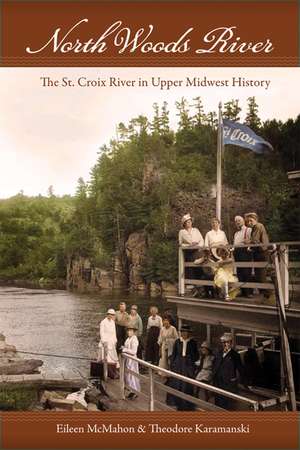North Woods River: The St. Croix River in Upper Midwest History: Wisconsin Land and Life
Autor Eileen M. McMahon, Theodore J. Karamanskien Limba Engleză Paperback – 19 oct 2009
The St. Croix River, the free-flowing boundary between Wisconsin and Minnesota, is a federally protected National Scenic Riverway. The area’s first recorded human inhabitants were the Dakota Indians, whose lands were transformed by fur trade empires and the loggers who called it the “river of pine.” A patchwork of farms, cultivated by immigrants from many countries, followed the cutover forests. Today, the St. Croix River Valley is a tourist haven in the land of sky-blue waters and a peaceful escape for residents of the bustling Minneapolis–St. Paul metropolitan region.
North Woods River is a thoughtful biography of the river over the course of more than three hundred years. Eileen McMahon and Theodore Karamanski track the river’s social and environmental transformation as newcomers changed the river basin and, in turn, were changed by it. The history of the St. Croix revealed here offers larger lessons about the future management of beautiful and fragile wild waters.
North Woods River is a thoughtful biography of the river over the course of more than three hundred years. Eileen McMahon and Theodore Karamanski track the river’s social and environmental transformation as newcomers changed the river basin and, in turn, were changed by it. The history of the St. Croix revealed here offers larger lessons about the future management of beautiful and fragile wild waters.
Preț: 146.87 lei
Nou
Puncte Express: 220
Preț estimativ în valută:
28.11€ • 29.24$ • 23.56£
28.11€ • 29.24$ • 23.56£
Carte disponibilă
Livrare economică 21 februarie-07 martie
Preluare comenzi: 021 569.72.76
Specificații
ISBN-13: 9780299234249
ISBN-10: 029923424X
Pagini: 352
Ilustrații: 23 b-w illus., 9 maps
Dimensiuni: 152 x 229 x 25 mm
Greutate: 0.45 kg
Ediția:1
Editura: University of Wisconsin Press
Colecția University of Wisconsin Press
Seria Wisconsin Land and Life
ISBN-10: 029923424X
Pagini: 352
Ilustrații: 23 b-w illus., 9 maps
Dimensiuni: 152 x 229 x 25 mm
Greutate: 0.45 kg
Ediția:1
Editura: University of Wisconsin Press
Colecția University of Wisconsin Press
Seria Wisconsin Land and Life
Recenzii
“This excellent book will inform newcomers to the valley about the history of their new home, and it will give all readers a better understanding of how successive waves of people have interacted with and altered the natural landscapes of the area.”—Robert Gough, author of Farming the Cutover: A Social History of Northern Wisconsin, 1900–1940
“[T]he authors take a refreshingly realistic stand on the significance of their subject. That said, they convincingly claim that ‘the St. Croix Valley encapsulates the history of the Upper Midwest.’ This makes the book useful not only for interested readers and local historians but also for anyone anxious to understand the broader dynamics that shaped the region’s past.”—Michael J. Lansing, Minnesota History
“This volume presents a thorough, carefully researched and well-written history of the St. Croix River. It should be required reading for anyone charged with managing the St. Croix and its valley in the twenty-first century.”—Environmental History
Notă biografică
Eileen McMahon is assistant professor of history at Lewis University. Theodore Karamanski is professor of history at Loyola University.
Cuprins
List of Illustrations
Acknowledgments
Introduction
Chapter 1. Valley of Plenty, River of Conflict
The Dakota and Their Neighbors
French Fur Traders on the St. Croix
The Origins of the Dakota-Ojibwe War
English Fur Traders on the St. Croix
A Social History of the Fur Trade in the St. Croix Valley
The Ecological Impact of the Fur Trade
The American Fur Company Era
Dakota-Ojibwe Relations during the American Era
The Treaties of 1837
Strangers on the Land: The St. Croix Indians in the Settlement Era
Chapter 2. River of Pine
From Fur Trade to Fir Trade
Frontier Logging: Life in the Forest
Frontier Logging: The Importance of Waterpower
The St. Croix Boom Company
Industrial River
The Log Drives
A River Jammed with Logs
Industrial Logging
Corporate Control of the St. Croix
The Failure of Government Regulation of the St. Croix Pinery
Fire in the Forest
The Last Days of the Lumber Frontier
The Impact of Logging on the St. Croix Valley
Chapter 3. "The New Land": Settlement and Agriculture
Dividing the Valley
Farmers and the Repopulation of the Valley
The Swedish Frontier
Land Speculation and Growing Pains
The Civil War Years in the St. Croix Valley
The Farming Frontier Moves up the Valley
Railroads: Regional Rivalry and Growth
From Wheat to Dairy Farming
Farming the Cutover
Chapter 4. Up North: The Development of Recreation in the St. Croix Valley
Steamboats and the "Fashionable Tour"
Railroads and the Growth of Tourism
Hunting, Fishing, and Tourism
Interstate Park and the Last Stand of the Steamboat Men
Dam the St. Croix!
Sportsmen of the Upper St. Croix
Government Conservation and the Invention of the North Woods
Return of the Tourist
Dam the St. Croix, Again
Saving the St. Croix
Notes
Bibliography
Index
Acknowledgments
Introduction
Chapter 1. Valley of Plenty, River of Conflict
The Dakota and Their Neighbors
French Fur Traders on the St. Croix
The Origins of the Dakota-Ojibwe War
English Fur Traders on the St. Croix
A Social History of the Fur Trade in the St. Croix Valley
The Ecological Impact of the Fur Trade
The American Fur Company Era
Dakota-Ojibwe Relations during the American Era
The Treaties of 1837
Strangers on the Land: The St. Croix Indians in the Settlement Era
Chapter 2. River of Pine
From Fur Trade to Fir Trade
Frontier Logging: Life in the Forest
Frontier Logging: The Importance of Waterpower
The St. Croix Boom Company
Industrial River
The Log Drives
A River Jammed with Logs
Industrial Logging
Corporate Control of the St. Croix
The Failure of Government Regulation of the St. Croix Pinery
Fire in the Forest
The Last Days of the Lumber Frontier
The Impact of Logging on the St. Croix Valley
Chapter 3. "The New Land": Settlement and Agriculture
Dividing the Valley
Farmers and the Repopulation of the Valley
The Swedish Frontier
Land Speculation and Growing Pains
The Civil War Years in the St. Croix Valley
The Farming Frontier Moves up the Valley
Railroads: Regional Rivalry and Growth
From Wheat to Dairy Farming
Farming the Cutover
Chapter 4. Up North: The Development of Recreation in the St. Croix Valley
Steamboats and the "Fashionable Tour"
Railroads and the Growth of Tourism
Hunting, Fishing, and Tourism
Interstate Park and the Last Stand of the Steamboat Men
Dam the St. Croix!
Sportsmen of the Upper St. Croix
Government Conservation and the Invention of the North Woods
Return of the Tourist
Dam the St. Croix, Again
Saving the St. Croix
Notes
Bibliography
Index
Descriere
The St. Croix River, the free-flowing boundary between Wisconsin and Minnesota, is a federally protected National Scenic Riverway. The area’s first recorded human inhabitants were the Dakota Indians, whose lands were transformed by fur trade empires and the loggers who called it the “river of pine.” A patchwork of farms, cultivated by immigrants from many countries, followed the cutover forests. Today, the St. Croix River Valley is a tourist haven in the land of sky-blue waters and a peaceful escape for residents of the bustling Minneapolis–St. Paul metropolitan region.
North Woods River is a thoughtful biography of the river over the course of more than three hundred years. Eileen McMahon and Theodore Karamanski track the river’s social and environmental transformation as newcomers changed the river basin and, in turn, were changed by it. The history of the St. Croix revealed here offers larger lessons about the future management of beautiful and fragile wild waters.
North Woods River is a thoughtful biography of the river over the course of more than three hundred years. Eileen McMahon and Theodore Karamanski track the river’s social and environmental transformation as newcomers changed the river basin and, in turn, were changed by it. The history of the St. Croix revealed here offers larger lessons about the future management of beautiful and fragile wild waters.




























